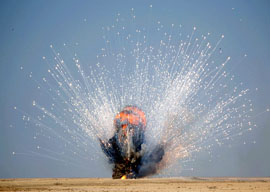
May 28, 2012

And then we drove back to the prison and sat in the Range Rover’s cool air watching the locally employed Iraqi builders work on a hot day. Sunil made money when the Army washed its clothes in his washing machines, put people in his prison, moved around the camp on his buses, and when they went to the toilet. He wanted more of the war. He asked me about other opportunities and I told him that kind of information was way above my pay grade. I wasn”t the organ grinder, but he knew I could get things done.
He told me he planned to expand his business to Afghanistan. He wasn”t happy that another company from Dubai had won the contract to supply the Army with food and that another was supplying the fuel and another was building the roads. Sunil wanted it all. He asked me to leave the military and offered me thousands of tax-free dollars to work for him. At the time, the Americans and the British were airlifting supplies into Pakistan and driving them across to Afghanistan. They would lose up to fifty percent of these supplies to bandits, and Sunil wanted me to smooth the route with money and diplomacy talking to the tribal leaders. He couldn”t do it because he was a Hindu. It wasn”t merely a straight deal with paying the tribal leaders off. He wanted to know what they wanted”if it was a school in their village, he”d build it and charge the military for it. And then they”d talk about Sunil in the village too, I guess.
That’s how you make money in the war. Sure, there were the military contractors and the oil giants they protected that we all know about, but there were also men such as Sunil”men who didn”t mind the danger and the dirt and who got rich and fat for it. The last I heard, Sunil was working in Afghanistan. When we pull out, he”ll be waiting for our next war.
* Anyone who served in Basra in 2006/07 will know Sunil’s real name.